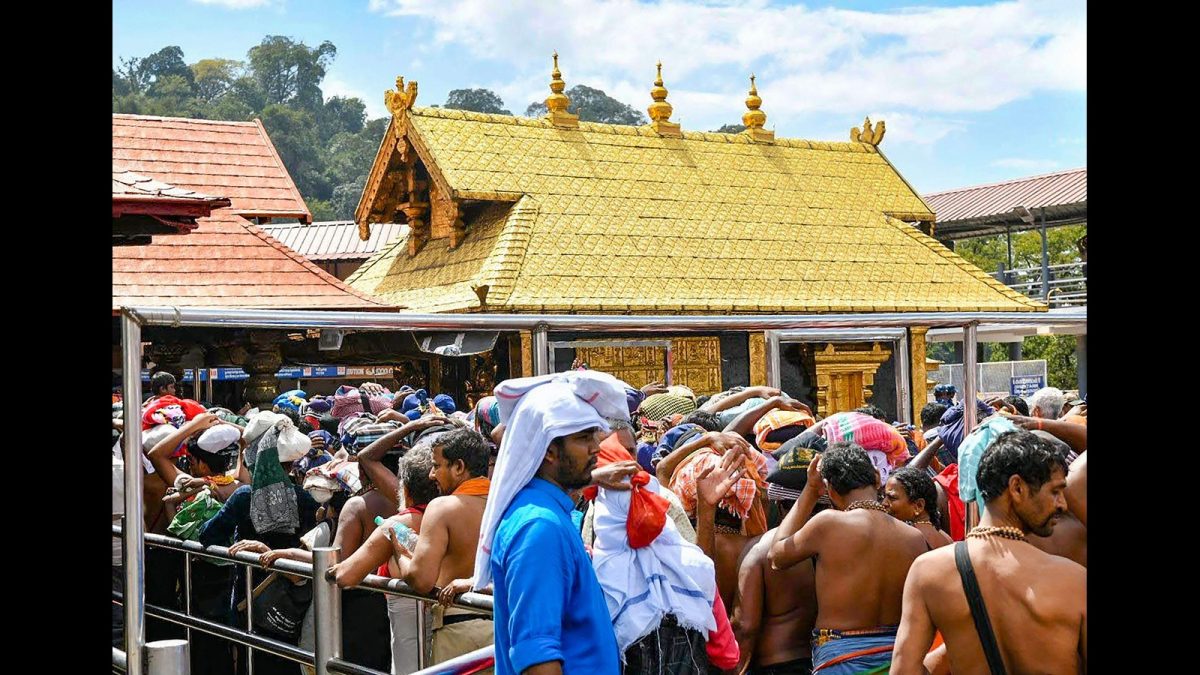Last Updated:
Palpable anxiety, especially among a section of Christian communities, over the alleged rise of radical Islamic elements has now become a defining fault line ahead of the assembly elections
The controversy over Sabarimala, which saw massive Hindu mobilisation against the Left government’s handling of temple entry for women, may be revived by BJP in Kerala. (PTI)
Kerala, over the past few years, has been witnessing a strange and unlikely alliance emerging and shaping its political landscape.
Palpable anxiety, especially among a section of Christian communities, over the alleged rise of radical Islamic elements has now become a defining fault line ahead of the assembly elections, with both the ruling LDF and the Congress-led UDF almost grappling with internal contradictions over their positioning.
This anxiety is also prompting the BJP and a section of the Christian community to reach out to each other for survival. Even though the RSS-BJP combination has been fighting a prolonged battle against the Christian missionaries over the ‘illegal’ religious conversion in several states, the ground scenario in Kerala is different. In fact, the party has found support in a section of Keralite Christians — primarily the Syro-Malabar community — over the allegations of ‘Love Jihad’ and ‘Narcotic Jihad’.
BJP’s Unlikely Alliance
As the BJP sharpens its narrative on ‘jihadi infiltration’ and communal appeasement, the Congress remains divided between its traditional secular stance and growing concerns over alienating Hindu voters.
The ruling CPI(M) also struggles to balance the party’s ideological commitment with political pragmatism. BJP, which had never come to power in the state, has now been taking the initiative to shift the sand in the southernmost coastal state. And it has got an unlikely ally among the Christians.
As a result, Kerala’s political battleground is shifting as allegations of rising Islamic radicalism stir debates across party lines, exposing deep-seated tensions within both the ruling Left and the Congress-led UDF. With some Churches publicly criticising the alleged ‘Islamic radicalism’, restricting Namaz in their premises and also submitting recommendations to the joint parliamentary committee against the Waqf board, over the past few months, the chorus is getting more prominent.
However, the real test lies within the Congress and CPI(M), both of whom are currently dealing with inter-party conflicts over ideological commitments, leadership issues and electoral compulsions.
Congress: Balancing Act or Breakdown?
The Congress unit in Kerala seems to be battling an existential crisis. Long positioned as the state’s principal opposition to the Left, the party now finds itself stuck between its secular foundations and the growing clamour from within to face and address what some see as unchecked influence of hardline Islamic elements.
Senior leaders, including the Keralite national leaders, remain divided—one faction argues that overtly challenging radical groups could alienate the powerful Muslim electorate, a key voter base of the UDF, while another section believes the party risks losing Hindu support if it continues to tread softly on issues of radicalism.
Recent incidents, including the PFI ban and reports of sleeper cells linked to global terror outfits, have fuelled concerns, with the BJP exploiting every opportunity to paint both the Congress and CPM as parties that indulge in “minority appeasement”.
The Congress’ dilemma is compounded by its relationship with the IUML, a key UDF ally, which holds strong sway in Muslim-dominated districts.
CPM: Pragmatism Vs Politics
Meanwhile, the ruling CPM is also trying to navigate the evolving narrative. While the party has historically opposed any form of religious fundamentalism—both Hindu and Islamic—it has now been accused of selectively targeting Hindutva groups while allegedly ignoring radical elements within Muslim communities.
The Left’s strong outreach to Muslim voters, particularly after the PFI ban, has drawn sharp criticism from within its own ranks, with some leaders warning that an overt alignment with Muslim interests could alienate their otherwise captive Hindu voters, particularly in areas where the BJP is making slow but steady gains.
The ruling CPM is caught in a rare dilemma — whether to continue with their age-old slogans by branding PM Narendra Modi as ‘fascist’ or tread carefully to avoid alienating Hindu voters. The hesitation is new, an apparent deviation from its announced party line.
In a detailed note for its 24th party congress, CPM explained why it is not calling Modi ‘fascist’ or ‘neo-fascist’. Significantly, the party is now in power in only one state — Kerala — while it is not making any reasonable mark as the opposition in Bengal or Tripura, where the party ruled for decades. Some of the senior leaders News18 spoke with also feel that the party needs to evolve, accepting the new political reality.
Historically and traditionally, the party has been vocal in labelling the BJP government ‘fascist’. However, a year ahead of elections, the shift is visible. With the BJP making slow but steady inroads, CPM in not in a position to ignore them. The senior leaders fear that aggressive rhetoric could push more Hindu voters towards the saffron camp.
Sabarimala Factor: A State in Flux
For the RSS-BJP combination, Kerala still remains an uncharted front in South India, and the party is banking on a mix of Hindutva politics and the fear of radicalism to boost its chances.
The controversy over Sabarimala, which saw massive Hindu mobilisation against the Left government’s handling of temple entry for women, still lingers in public memory, and the party is expected to revive this issue while also pushing narratives of alleged Islamic radicalisation.
Even though the BJP still lacks a strong organisational presence in the state, it has been strategically leveraging central investigating agencies like the NIA and ED to highlight cases of terror financing and extremist networks with a clear goal of exposing an alleged terror link.
As Kerala approaches elections, the fear of Islamic radicalisation—real or manufactured—will surely play a crucial role in shaping the electoral-political discourse.
- Location :
Thiruvananthapuram, India, India







